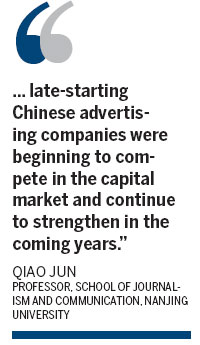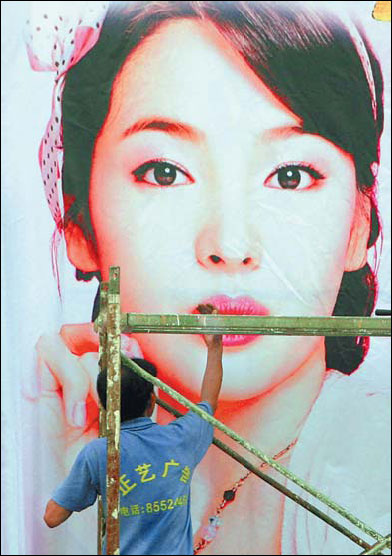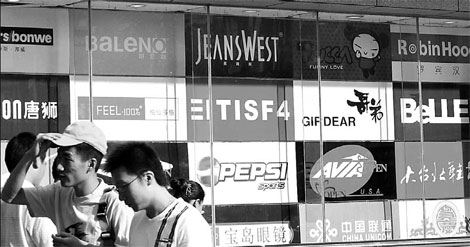Ad agencies campaigning for more business
Updated: 2012-04-23 07:56
By Meng Fanbin (China Daily)
|
||||||||
|
A worker preparing an outdoor advertising board in Nanjing, Jiangsu province. China's advertising market is growing rapidly, but the main players remain foreign firms. An Xin / For China Daily |
Multinational agencies are winning the battle for the biggest advertisers
Tony Fan, 35, the owner of a Beijing-based advertising agency, had been talking the whole day with his business partners about the company's latest failed bid, which was won by a multinational advertising company.
"Instead of feeling depressed, I'm honored to have the chance to compete with large international companies," he said.
His company, IBrand Solution (Beijing) Ltd, founded in 2006, is a small one with fewer than 10 employees and an annual profit of only several million yuan. Its clients range from international non-governmental organizations to regional consumer goods companies.
Some multinational advertising corporations are in de facto control of China's advertising market due to their advanced management, rich experience, adequate funding and high-end professionals.
Since the opening-up of the Chinese market at the end of 1970s, the rapid development and potential of the nation's advertising market attracted the attention of members of the American Association of Advertising Agencies, known as 4A enterprises, which were eager to enter China in the 1990s.
Statistics show domestic advertising agencies generated revenue of 94.04 billion yuan ($14.94 billion) in 2010, which accounts for only 40.18 percent of China's total advertising turnover, up 10.7 percent year-on-year, lower than the average growth of the industry.
At the same time, there were only three domestic advertising companies among the top 10 advertising agencies by annual revenue in 2010 - Charm Communications Inc, Guangdong Advertising Co Ltd and AVIC Culture Co Ltd.
Data from the China Advertising Association shows that the top 10 advertising agencies realized revenue of 36.4 billion yuan in 2010, accounting for 39 percent of advertising agencies' total turnover, rising 4 percentage points from the year before. More clients and high quality resources have been attracted to large advertising companies, especially multinationals.
"Multinational advertising agencies have more adequate finance, more advanced technology and management and more talents, posing a threat to domestic agencies," said Professor Huang Shengmin, dean of the Advertising School at Communication University of China.
With a globally unified working system and specific analytical tools, Ogilvy & Mather Advertising, one of the largest marketing communication companies in the world, possesses not only a global service network but has also accumulated large amounts of professional knowledge, Shenan Chuang, CEO of Ogilvy & Mather Greater China, told China Daily in an exclusive interview.
"Compared with young Chinese advertising agencies, foreign advertising conglomerates understand the market economy and marketing management more deeply and comprehensively," said Dang He, chairman and chief executive of Charm Communications Inc.
The State Council released the plan on culture industry revitalization on Sept 26, 2009, the first time that China announced clearly and definitely that it would boost the development of the culture industry, such as advertising, comics and animation. As a result, advertising became a strategically important industry that the nation was going to foster.
The following year, four Chinese advertising companies were listed.

This "was a sign that late-starting Chinese advertising companies were beginning to compete in the capital market and continue to strengthen in the coming years", said Qiao Jun, a professor at the School of Journalism and Communication at Nanjing University.
Statistics show that the number of advertising agencies in China reached 243,000 in 2010, with total revenue of 234.05 billion yuan in the year and 1.48 million employees.
China is already the world's second-largest advertising market, Chairman of International Advertising Association Alan Rutherford said at the International Advertising Festival held in Changsha in May 2011.
Top enterprises
Multinational advertising companies already had rich experience before they entered China. On the other hand, advertising was new to most Chinese, who had not experienced or realized its value, said Professor Huang.
At the beginning of reform and opening-up, Chinese people preferred foreign products and ideas, and most advertisements for foreign brands were successful, he added.
As a result, 4A enterprises quickly set the standard in China's advertising industry.
The year 1979 was seen as "the first year of Chinese advertising", said Dang He, who was also co-founder of Charm Communication.
With global unified working systems, multinationals' branches share the systematic and well-established professional knowledge accumulated by their parent companies, said Shenan Chuang, a senior advertiser, who has worked for Ogilvy & Mather for 27 years.
Ogilvy & Mather Advertising arrived in the mainland in 1991 and is the largest advertising agency in China. It employs more than 2,400 people across 29 offices in 18 markets. It provides its customers with accurate data with the help of professional analysis tools, which draw comparatively correct and effective solutions, said Chuang, stressing that its analysis tools always "keep up with the times".
Corporate culture
"O&M treasures talented people and pays lots of attention to different levels of personnel training," she said.
Besides training, 4A enterprises offer employees plenty of development choices and transfers between different cities and countries are possible, she added. "For example, outstanding persons who work in Beijing have the chance to work in New York."
Proud of O&M's corporate culture, Chuang said a good working environment is one of the most important factors for successful advertising multinationals.
"Unlike Chinese agencies, we are concerned about teamwork rather than individual heroes. Individual ability is important, but we always work as a team."
Chuang, who has been working in Beijing for 10 years, also expressed her view on the localization of multinationals.
"Up to 90 percent of our employees are from China and most senior managers have lived in China for more than 10 years. O&M knows the Chinese market comprehensively and deeply.
"Furthermore, 4A enterprises have never stopped merging and acquiring local advertising agencies," Chuang added. They firstly set up joint ventures with domestic advertising agencies in order to gain access to China's market.
The Provisions on the Administration of Foreign-funded Advertising Enterprises, adopted by the State Administration for Industry and Commerce and the Ministry of Commerce in March 2004, stipulated that from Dec 10, 2005, the Chinese advertising market would be fully open to foreign capital.
In 2005, 4A enterprises started a new round of expansion in China. They set up sole investment subsidiaries to participate in, control, and acquire China's high-quality advertising agencies to build large-scale communication groups.
December 2011 saw O&M's acquisition of Nanjing Yindu Advertising Agency, the largest full-service marketing agency in Jiangsu province. The acquisition bolstered Ogilvy's services and reach in the Yangtze River Delta, a crucial region that encompasses not only Jiangsu province but also Anhui and Zhejiang provinces, the future battleground for global brands and a hot spot for up-and-coming Chinese brands.
"Yindu Ogilvy will further strengthen O&M's offering in second-tier Chinese cities as global brands target the next wave of competition in these critical markets," O&M said on its website.
Through large-scale procurement, multinational advertising companies got stronger, extended their marketing networks, and integrated into the local market, said Huang.
Foreign advertising companies have also extended their business to upstream and downstream industries, such as the survey industry, sales promotion, consulting business and public relations, said Chuang.
Rise of domestic firms
Only one 4A enterprise was included in the CCTV 2010 Top 10 Best Advertising Agencies, which was announced on March 9, 2011, and there were only three among the top 20.
Professor Huang said that "multinationals actually in a way promote the development of China's advertising industry by shortening its growth process. Local agencies learn a lot from their opponents, for example, in the aspects of company management and creativity".
"Local companies, which are familiar with Chinese social circumstances, consumption characteristics and the local media, integrate closely with Chinese culture and satisfy the needs of local customers," said Charm Communications Chairman and Chief Executive Dang He.
By April 2011, 14 Chinese local advertising agencies had been listed.
In 2010, four corporations went public in succession - Spearhead, Bluefocus, Charm Communications and Guangdong Advertising.
Other Chinese advertising companies such as D&S Communication Group, Who's Who Advertising, Linksus and Shunya Communication Group are planning IPOs.
"Focus Media's listing on the Nasdaq set an example for other domestic advertising agencies to finance on the stock market. A growing number of Chinese advertising companies will be listed in the near future," said Zhang Xiang, vice-dean at the School of Communication and Art at Beijing Technology and Business University.
The rapid capital reconstruction of domestic agencies promotes their own development. For instance, Guangdong Advertising has enlarged its operating scale through assets recombination.
In 2010, Charm Communications, one of the biggest domestic advertising companies, went public and cooperated with Aegis Media, which helped the company to become an internationalized and specialized advertising group, said Dang.
"At the same time, Charm Communications has accelerated the upgrading of its operating standards, working tools, business distribution and company management," he added.
Qiao Jun said that during the 12th Five-Year Plan (2011-2015), domestic advertising agencies will increasingly expand and multinationals' domination of China's advertising industry will probably change.
There may be tougher competition between locals and multinationals and the two parties may share the market equally, Qiao predicted. High-end talent would also flow back to domestic advertising companies.
With the growth of local clients and the development of Chinese advertising agencies, local companies have opportunities to grow bigger and stronger due to the large amount of and different level of clients, Dang said.
Chuang predicted that "advertising multinationals will maintain their leading position in China's advertising market for at least the next five years".
Challenges ahead
Although Tony Fan, the advertising agency owner, said small agencies like his, are more flexible than the larger ones, owning to low expenditure and flexible strategies, the advertiser, who graduated from Guanghua School of Management at Peking University, also expressed a pessimistic view of the possibility that local advertising agencies can overtake their international rivals.
He said 4A enterprises' development was closely related to their multinational clients' progress in China, but there is little chance that Chinese companies can create internationally recognized brands.
As newcomers to China, foreign advertising companies' fortunes are inextricably linked with their clients, multinational corporations such as Procter & Gamble and Unilever.
High-end talents are essential to the development of local agencies because advertising is a knowledge-intensive, technology-intensive, talent-intensive industry, Huang explained.
Shenan Chuang, who is also the founding chairman and the incumbent chairman of the Association of Accredited Advertising Agencies of China, also known as China 4A, which has 23 multinational members and 24 local members, said that Chinese advertising agencies should attach more importance to personnel training.
Few domestic agencies attended the personnel training sessions organized by China 4A a few years ago because Chinese companies are reluctant to pay for this kind of training.
Chinese advertising companies should improve their management abilities, build better operating systems and upgrade analytical tools to enlarge their business quickly in different cities in China, Chuang said.
In order to become global players, they should cooperate with each other through an industry association, she added.
mengfanbin@chinadaily.com.cn
|
People walking past an advertising board of logos in Nanjing, Jiangsu province. Despite the de facto control of the market by foreign firms, local advertising companies have an edge in understanding local culture. Xiao En / For China Daily |

 Relief reaches isolated village
Relief reaches isolated village
 Rainfall poses new threats to quake-hit region
Rainfall poses new threats to quake-hit region
 Funerals begin for Boston bombing victims
Funerals begin for Boston bombing victims
 Quake takeaway from China's Air Force
Quake takeaway from China's Air Force
 Obama celebrates young inventors at science fair
Obama celebrates young inventors at science fair
 Earth Day marked around the world
Earth Day marked around the world
 Volunteer team helping students find sense of normalcy
Volunteer team helping students find sense of normalcy
 Ethnic groups quick to join rescue efforts
Ethnic groups quick to join rescue efforts
Most Viewed
Editor's Picks

|

|

|

|

|

|
Today's Top News
Health new priority for quake zone
Xi meets US top military officer
Japan's boats driven out of Diaoyu
China mulls online shopping legislation
Bird flu death toll rises to 22
Putin appoints new ambassador to China
Japanese ships blocked from Diaoyu Islands
Inspired by Guan, more Chinese pick up golf
US Weekly

|

|








